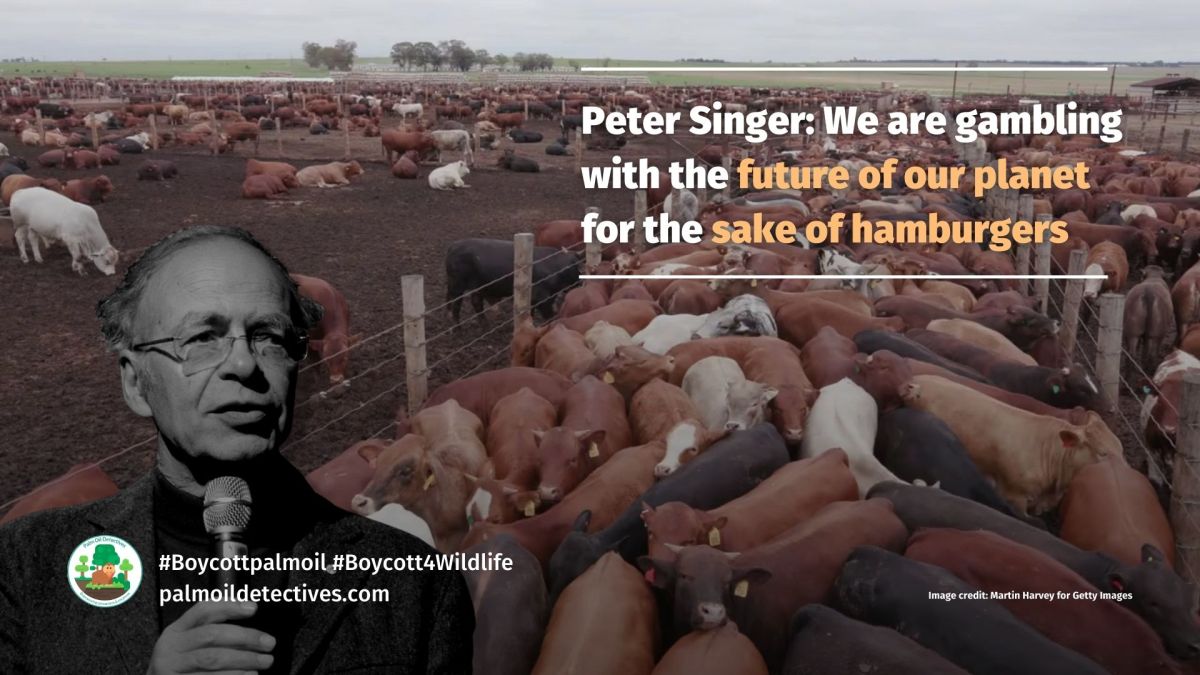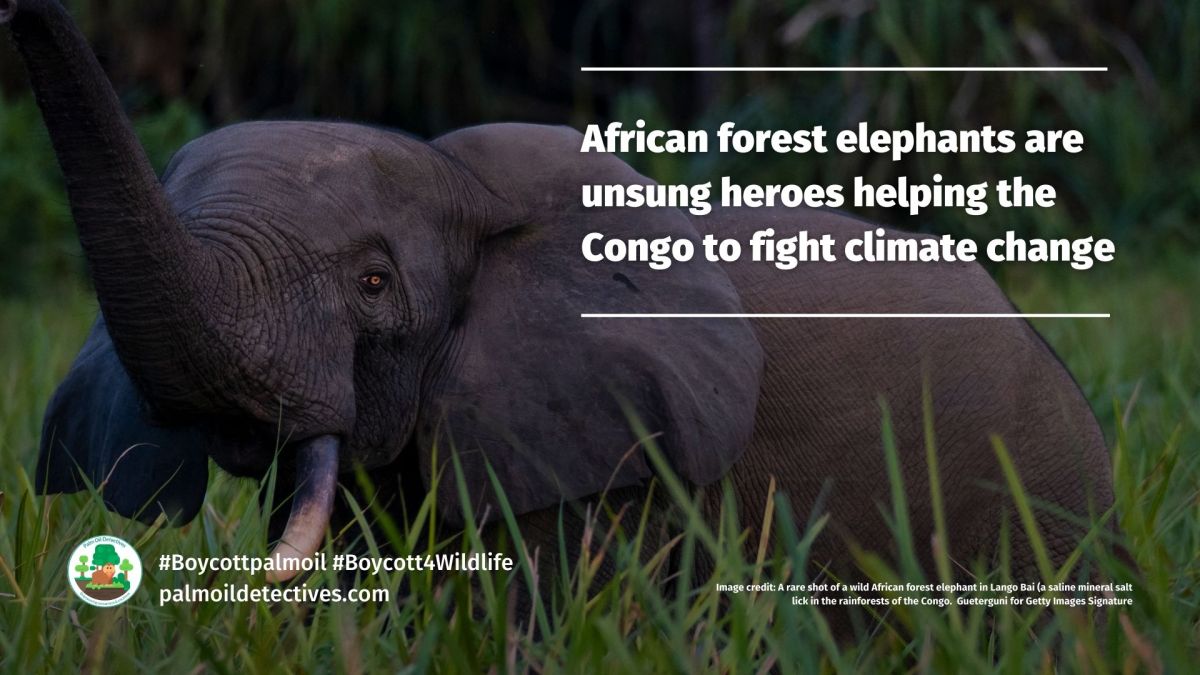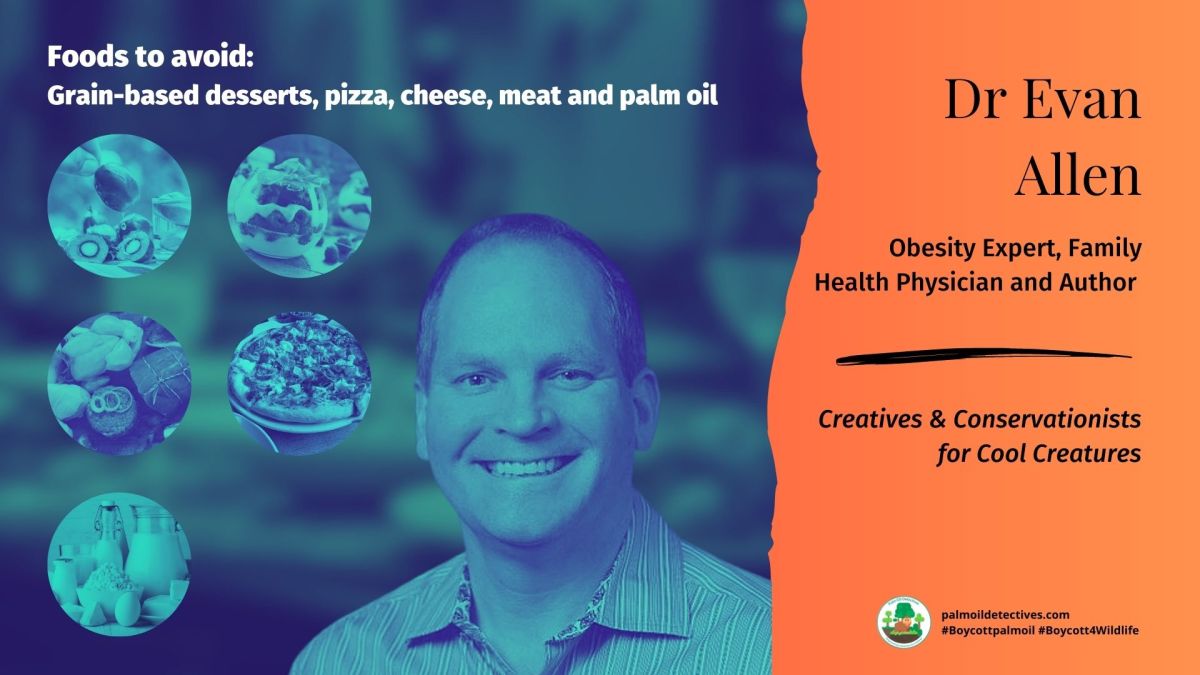“Sustainable” Avaiation Fuel (SAF) is a biofuel alternative to using fossil fuels for powering planes and cars. SAF is being aggressively marketed by multiple industries as a greener alternative to burning fossil fuels in cars and airplanes.
However, SAF is produced from food crops such as rapeseed, palm oil, soy and sugar cane. This requires vast swathes of land to grow. This also means mass deforestation of land that is rich in biodiversity, putting at risk already threatened animals and plants and indigenous peoples all over the world. Emissions from palm oil-derived biodiesel are three times higher than fossil fuel diesel. According to Transport & Environment EU food-based biodiesel leads to around 80% higher emissions than the fossil fuel diesel that it replaces. Read on to find out how you can take action.
DYK that “Sustainable” Biofuel (#SAF) used in planes/cars is blatant #palmoil #greenwashing? Emissions from palm-oil #biofuels are 3x higher than fossil fuels! Say NO to palm oil trash, sign the petition! #Boycottpalmoil #Boycott4Wildlife @palmoildetect https://wp.me/pcFhgU-75Y
#Palmoil derived #biofuel is fuelling the #climatecrisis with #ecocide. Despite #greenwashing claims – one football field of destroyed rainforest powers only 2.4 cars for one year! Sign the petition to reject this insanity! #Boycottpalmoil @palmoildetect https://wp.me/pcFhgU-75Y







Originally published by Irish EVs as “Biofuel: A Greenwashing Battleground” read the original article here.
Biofuel: A Greenwashing Battleground
Despite numerous independent studies demonstrating time and again that battery electric vehicles offer the only viable solution for the future of road transport – if we are to succeed in averting the worst outcomes of the Climate Crisis – myths about so-called ‘alternative fuels’ persist.
Those who have a vested interest in the oil industry and the associated infrastructure of pipelines and petrol stations have long been reluctant to commit to the switch to supporting battery electric vehicles, and as such have invested heavily in greenwashing and the development of new liquid fuels.
While we have covered the misleading greenwashing around the development of eFuels previously, today we take a look at the broader world of biofuels and highlight the many reasons why they offer no viable solution for the future and why their ‘green’ label must be dropped.
What is biofuel?
In its simplest form, a biofuel is produced from plant matter through man-made processes which are considerably quicker than the thousands of years that it takes for oil to naturally occur in the Earth.
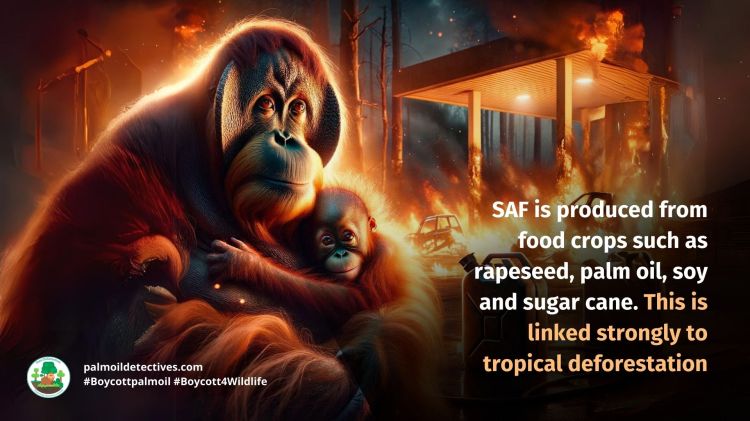
The first major challenge of biofuels – land requirements
Biofuels are produced from food crops such as rapeseed, palm oil, soy and sugar cane. They require vast swathes of land to grow, which requires either that land which was previously used to produce food for human consumption is set aside to produce fuel, or it requires the clearance of new land.
The former increases food shortages and lowers levels of nutrition in the diets of the poorest people on the planet, while the latter requires that virgin forest and wetlands are destroyed in order to produce an inefficient form of fuel that barely compares to the efficiency of battery electric vehicles.
A 2008 study by The Nature Conservancy in Minneapolis, Minnesota found that for every 10,000 square metres of Brazilian rainforest cleared for growing soya to make biodiesel, over 700 tonnes of CO2 would be released.
As such, any carbon saving from the resulting biodiesel (compared to fossil fuel diesel) would take around 300 years of continual use in order to cancel out the climate impact of the rainforest destruction.

To put these figures into context, it would take a field the size of a standard football pitch covered in crops to fuel just 2.4 cars over the course of one year. If that land were instead covered with solar panels, it would power 260 battery electric cars in one year.
As of 2021, an area the size of the Netherlands (41,543 square kilometres) has been deforested around the world in order to support biofuel production over the past decade.
In fact, biodiesel current uses 44% of all vegetable oils consumed in Europe – oils that are perfectly good for human consumption.
“A field the size of a football pitch would produce enough biofuels for 2.4 cars per year”
Transport and Environment
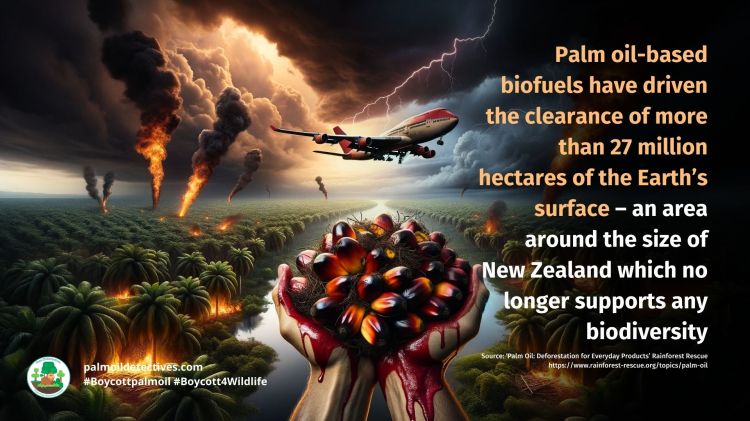
The ‘Green Miracle’ of Biofuel: In Reality a Greenwashing Lie
You don’t have to look far to see various corporations claiming that biofuels are some ‘green’ miracle.
From your local petrol station – where every petrol brand is at least 5% biofuel – to the sporting giant that is Formula 1, there are widespread claims that biofuels are the answer to the Climate Crisis.

In fact, a Formula 1 press release from 2019 states: “As part of Formula 1’s ambitious sustainability strategy that targets a net-zero carbon footprint by 2030, biofuels will play a major part in the championship. [Biofuels] is a word that gets bandied about quite a lot, so we prefer to use the phrase ‘advanced sustainable fuels’”.
This is greenwashing in action.
As more and more people become aware of the enormous harm that biofuels can wreak on our ecological systems and our climate, they are rebranding them to sound more innocuous and advanced.
But how harmful are they for our climate and human health?
At present, around four in every five litres of biofuel sold in the EU is biodiesel, according to Transport & Environment. They also detail that, on average, EU food-based biodiesel leads to around 80% higher emissions than the fossil fuel diesel that it replaces.
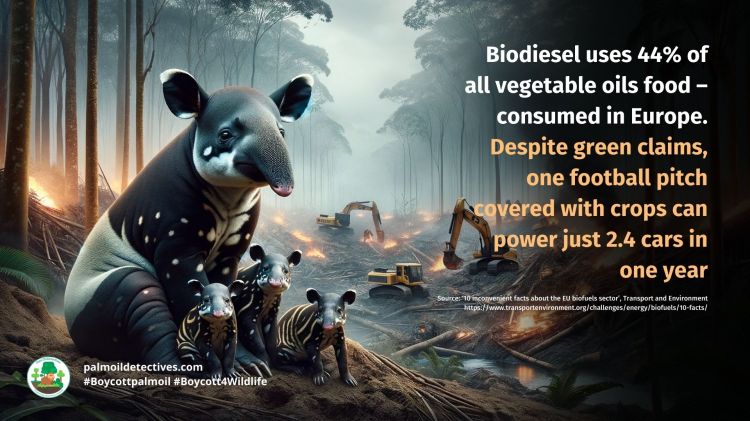
As such the use of biofuels effectively increases the emissions from the road transport sector to the tune of an additional 12 million extra cars per year.
Furthermore, emissions from palm oil-derived biodiesel are three times higher than fossil fuel diesel. This is a significant finding given that more than half of all palm oil imported into the EU is used to produce biodiesel, making drivers the biggest consumers of palm oil.
While many have boycotted foodstuffs that contain palm oil due to its huge environmental destruction, few are aware that such climate action is eclipsed if they drive a biodiesel-powered vehicle.
Beyond the emissions they create, palm oil-based biofuels have driven the clearance of more than 27 million hectares of the Earth’s surface – that’s an area around the size of New Zealand which no longer supports any biodiversity.
“Emissions from palm oil-derived biodiesel are three times higher than fossil fuel diesel”
Furthermore, the production of monocultures like palm oil dramatically increases the risk of pests and diseases in crops, making them considerably more likely to fail. Meanwhile, the production of palm oil is directly linked to the dramatic loss of endangered species such as orangutans, while more than 700 land conflicts in Indonesia alone have let to human rights violations on a daily basis.

Those who promote the consumption of these biofuels – and those who continue to use them – are ultimately responsible for consistent ecocide, human rights violations and the destruction of our planet.
Closing The Loopholes
The rise in biofuel use has been led by the Renewable Energy Directive, which was introduced by the EU in 2010 with the aim of setting a 10% renewable energy target for the transport sector by 2020 for each member state. However, it has widely missed the mark, and even gone as far as further jeopardising our future.
Laura Buffet, Energy Director at Transport & Environment, commented: “Ten years of this ‘green’ fuel law and what have we got to show for it? Rampant deforestation, habitats wiped out and worse emissions than if we had used polluting diesel instead.”
“A policy that was supposed to save the planet is actually trashing it. We cannot afford another decade of this failed policy. We need to break the biofuels monopoly in renewable transport and put electricity at the centre of the Renewable Energy Directive instead.”

While an updated Renewable Energy Directive was adopted in 2018, which includes legislation to reduce palm oil biodiesels, the EU is still only planning to slowly phase out biofuel consumption by 2030.
This is far too late considering the ecological, climate and human impacts that these fuels have on a daily basis around the world.
It is clear that we need considerably more ambitious legislation to stamp out these fuels with immediate effect, and that the EU – and national governments – should focus on communicating the harm that they do, as well as communicating the clear efficiency gains afforded by battery electric vehicles.
That clear communication is essential to drive meaningful and informed climate action.
This is necessary to stem the worsening Climate Crisis that is already claiming lives and threatens to displace billions of people within our lifetime.
IrishEVs would encourage you to spread the word about biofuels, push back against the ‘green’ myth that they are being promoted under, and to boycott the consumption of these fuels if you do not already drive a battery electric vehicle.
Resolving the Climate Crisis will take action from us all, and time is running out.
Originally published by Irish EVs as “Biofuel: A Greenwashing Battleground” read the original article here.
ENDS
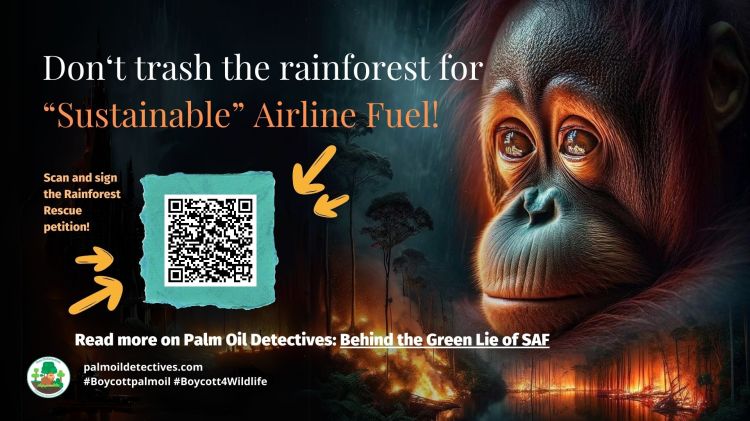
Take Action! #Boycott4Wildlife’s palm oil free revolution
- Sign this Rainforest Rescue Petition: ‘Don’t trash the rainforest for “green” jetfuel’.
- Enjoy a home-cooked meal: Use your imagination: why not try almond-coconut-pear biscuits? Or pizza with potato and rosemary? A meal cooked from fresh ingredients beats processed foods containing palm oil every time. Oils such as sunflower, olive, rapeseed or flaxseed are ideal for cooking and baking. Here are some recipes to enjoy.
- Read labels: As of December 2014, labeling regulations in the EU require food products to clearly indicate that they contain palm oil. However, in the case of non-food items such as cosmetics and cleaning products, a wide range of chemical names may still be used to hide the use of palm oil. Find palm oil free alternatives for these products here.
- Remember that the customer is king: Do you have a favourite brand that uses palm oil? Write to product manufacturers and ask them why they aren’t using domestic oils. Companies can be quite sensitive to issues that give their products a bad name, so inquiring with sales staff and contacting manufacturers can make a real difference. Public pressure and increased awareness of the problem have already prompted some producers to stop using palm oil.
- Sign petitions and write your elected representatives: Online campaigns put pressure on policymakers responsible for biofuels and palm oil imports.
- Speak out: Protest marches and creative action on the street raises public and media awareness of the issue of palm oil hidden on supermarket shelves and in petrol tanks. This turns up the heat on policymakers.
- Leave your car at home: Whenever you can, walk, ride a bicycle or use public transport.
- Be informed and inform others: Big Business and governments would like us to believe that biofuels are good for the climate and that palm oil plantations are “sustainable”. Learn about the problems associated with palm oil on this website, which includes: human rights abuses, deforestation, greenwashing, animal extinction, air pollution and carbon emissions, human health impacts.
Read more about deforestation and ecocide in the palm oil industry
Contribute in five ways
1. Join the #Boycott4Wildlife on social media and subscribe to stay in the loop: Share posts from this website to your own network on Twitter, Mastadon, Instagram, Facebook and Youtube using the hashtags #Boycottpalmoil #Boycott4Wildlife.
2. Contribute stories: Academics, conservationists, scientists, indigenous rights advocates and animal rights advocates working to expose the corruption of the palm oil industry or to save animals can contribute stories to the website.
3. Supermarket sleuthing: Next time you’re in the supermarket, take photos of products containing palm oil. Share these to social media along with the hashtags to call out the greenwashing and ecocide of the brands who use palm oil. You can also take photos of palm oil free products and congratulate brands when they go palm oil free.
4. Take to the streets: Get in touch with Palm Oil Detectives to find out more.
5. Donate: Make a one-off or monthly donation to Palm Oil Detectives as a way of saying thank you and to help pay for ongoing running costs of the website and social media campaigns. Donate here



